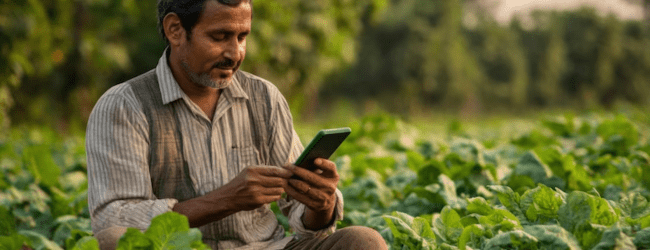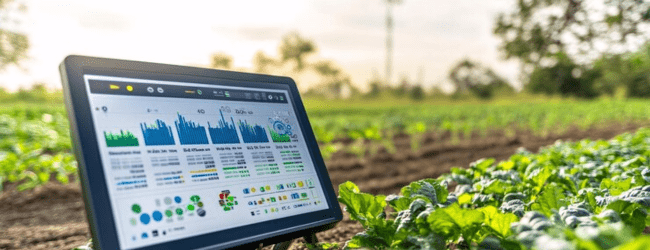Table of contents
Indian agriculture, a cornerstone of the nation’s economy, is undergoing a significant transformation. The adoption of technology, particularly precision farming in India, is paving the way for increased efficiency, productivity, and sustainability. This article delves into the technological advancements driving this change, the tangible benefits it offers to Indian farmers, and the immense market potential that lies ahead.
What is Precision Farming?

Precision farming, also known as precision agriculture or smart farming, is a modern agricultural management strategy that revolves around understanding and responding to the variability within a field. Instead of treating an entire field uniformly, precision farming utilises technology to observe, measure, and analyse site-specific data to optimise agricultural practices.
- Managing Variability: The core idea is that conditions like soil type, nutrient levels, moisture content, pest infestations, and even yield potential can vary significantly across a single field. Precision farming aims to identify and manage these variations.
- Information and Technology-Driven: It heavily relies on collecting and analysing data using various technologies, including:
- Global Positioning System (GPS): For precise location identification.
- Geographic Information Systems (GIS): For mapping and spatial analysis of data.
- Remote Sensing (Satellites and Drones): To gather data on crop health, soil conditions, and other factors from above.
- Sensors (Soil, Weather, Plant): Deployed in the field to collect real-time data.
- Variable Rate Technology (VRT): Equipment that can automatically adjust the application of inputs (fertilisers, seeds, pesticides, water) based on site-specific data.
- Data Analytics and Artificial Intelligence (AI): To process and interpret the collected data, providing insights for decision-making.
- Internet of Things (Iot): Connecting various devices and sensors for seamless data flow and automation.
- Site-Specific Management: The ultimate goal is to apply the right input, at the right rate, at the right time, and in the right place. This targeted approach contrasts with traditional methods, where the entire field receives the same treatment.
- Decision Support System: Precision farming provides farmers with data-driven insights to make more informed decisions regarding planting, fertilisation, irrigation, pest and disease management, and harvesting.
- Goals of Precision Farming:
- Increase efficiency and productivity: By optimising resource use and maximising yields.
- Reduce input costs: By minimising the waste of fertilisers, pesticides, and water.
- Improve environmental sustainability: By reducing the environmental impact of farming practices.
- Enhance farm profitability: Through higher yields and lower costs.
- Improve resource management: By using resources more effectively and sustainably.
- Think of it like moving from broadcasting fertiliser across your entire farm to applying the exact amount of nutrients needed in specific parts of the field.
💡 Pro Tip: If you want to start a business but have too many doubts, connect with a food business expert from Boss Wallah for guidance – Check Out
Key Technologies Driving Precision Farming in India
Several cutting-edge technologies are fueling the growth of precision farming in India:
- Global Positioning System (GPS): GPS technology allows for precise location identification within a field. This is crucial for:
- Accurate soil mapping: Identifying variations in soil types and nutrient levels across the farm.
- Variable rate application (VRA): Applying inputs like fertilisers, seeds, and pesticides at different rates based on the specific needs of different zones within a field.
- Precision guidance for machinery: Ensuring accurate navigation of tractors and other equipment, reducing overlaps and skips.
- Geographic Information Systems (GIS): GIS software helps in analysing spatial data collected from GPS and other sources. This enables farmers to:
- Create detailed maps of their farms: Visualising data on soil health, yield, pest infestations, and water availability.
- Make informed decisions: Based on the spatial analysis of various parameters.
- Track changes over time: Monitoring the impact of different farming practices.
- Remote Sensing: Satellites and drones equipped with specialised sensors capture valuable data about crops and fields:
- Crop health monitoring: Identifying areas with stress due to nutrient deficiencies, water scarcity, or pest attacks.
- Yield estimation: Predicting harvest output with greater accuracy.
- Water management: Assessing irrigation needs and identifying waterlogged areas.
- Example: Companies like Cropin and Skymet Weather utilise satellite imagery and drone technology to provide Indian farmers with actionable insights on crop health and weather patterns.
- Sensors: Various types of sensors deployed in the field collect real-time data:
- Soil moisture sensors: Measuring the water content in the soil to optimise irrigation scheduling.
- Nutrient sensors: Providing information on the availability of essential nutrients in the soil.
- Weather sensors: Monitoring temperature, humidity, rainfall, and wind speed at the farm level.
- Internet of Things (Iot): Iot connects various devices and sensors, enabling seamless data collection and communication. This facilitates:
- Automated irrigation systems: Adjusting water supply based on real-time soil moisture data.
- Remote monitoring of farm equipment: Tracking the performance and location of machinery.
- Data Analytics and Artificial Intelligence (AI): The vast amounts of data collected through precision farming technologies need to be analysed to extract meaningful insights. AI and machine learning algorithms help in:
- Predictive modelling: Forecasting yields, pest outbreaks, and disease risks.
- Optimising input application: Recommending the right amount of fertilisers, pesticides, and water at the right time and place.
- Decision support systems: Providing farmers with data-driven recommendations for various farming operations.
ALSO READ – Microgreens Farming in India: Steps, Investment, Profit, Easy Hacks & More
Benefits of Precision Farming for Indian Farmers

Adopting precision farming in India offers a multitude of benefits:
- Increased Efficiency and Productivity:
- Optimised use of resources like water, fertilisers, and pesticides leads to higher yields per unit of input.
- Precise planting and harvesting reduce wastage and maximise output.
- Example: Studies have shown that VRA of fertilisers can increase crop yields by 5-15% while reducing fertiliser use by up to 20%.
- Reduced Input Costs:
- Applying inputs only where and when needed minimises unnecessary expenses on fertilisers, pesticides, and water.
- Efficient use of machinery reduces fuel consumption and maintenance costs.
- Improved Resource Management and Sustainability:
- Precision irrigation helps conserve water, a critical resource in many parts of India.
- Targeted application of fertilisers and pesticides reduces environmental pollution and promotes soil health.
- Highlight: Precision farming contributes to more sustainable agricultural practices.
- Enhanced Farm Profitability:
- Higher yields and lower input costs directly translate to increased income for farmers.
- Improved quality of produce can fetch better market prices.
- Better Decision Making:
- Access to real-time data and analytical insights empowers farmers to make informed decisions about their farming practices.
- Risk management is improved through predictive modelling of potential challenges like pest attacks or droughts.
- Improved Soil Health:
- Precise nutrient management prevents over-fertilisation, which can degrade soil quality over time.
- Targeted tillage practices, guided by GPS, can minimise soil disturbance.
Market Potential of Precision Farming in India

The market potential for precision farming in India is immense and largely untapped. Several factors contribute to this:
- Large Agricultural Sector: India has a vast agricultural landmass and a large number of farmers, creating a significant potential user base.
- Growing Awareness: Increasing awareness among farmers about the benefits of technology and the need for sustainable practices is driving adoption.
- Government Support: The Indian government is actively promoting the adoption of modern technologies in agriculture through various schemes and initiatives.
- Emergence of Agri-tech Startups: A thriving ecosystem of agri-tech startups is developing innovative solutions for precision farming tailored to the needs of Indian farmers.
- Highlight: Indian agri-tech startups are playing a crucial role in making precision farming accessible and affordable.
- Increasing Availability of Affordable Technology: The cost of sensors, drones, and data analytics tools is gradually decreasing, making them more accessible to small and medium-sized farmers.
- Need for Increased Food Security: With a growing population, India needs to enhance its agricultural productivity, and precision farming offers a pathway to achieve this sustainably.
- Integration with Digital Agriculture Platforms: The rise of digital agriculture platforms is creating a conducive environment for the adoption of precision farming technologies by providing farmers with integrated solutions and market linkages.
- Financial Inclusion and Access to Credit: Improved access to credit and financial services enables farmers to invest in precision farming equipment and technologies.
Market Size and Growth: While the exact market size for precision farming in India is still evolving, industry reports indicate significant growth potential in the coming years. Factors like increasing farm mechanisation, the adoption of digital technologies, and government support are expected to drive this growth.
ALSO READ – Contract Farming in India: Meaning, How to Start, Benefits & More
Challenges to Adoption
Despite the immense potential, the widespread adoption of precision farming in India faces certain challenges:
- High Initial Investment Costs: The initial cost of sensors, GPS equipment, drones, and software can be a barrier for small and marginal farmers.
- Lack of Awareness and Technical Expertise: Many farmers lack the awareness and technical skills required to effectively utilise precision farming technologies.
- Fragmented Land Holdings: Small and fragmented landholdings can make it challenging to implement certain precision farming techniques.
- Limited Access to Infrastructure: Inadequate internet connectivity and power supply in rural areas can hinder the adoption of digital technologies.
- Data Privacy and Security Concerns: Farmers may have concerns about the privacy and security of the data collected from their farms.
- Need for Customised Solutions: Precision farming solutions need to be tailored to the specific crops, soil types, and climatic conditions prevalent in different regions of India.
Need Expert Guidance?
Starting a business can be challenging, but you don’t have to do it alone! At Boss Wallah, our 2,000+ business experts are ready to provide valuable insights and guidance. Whether you need help with marketing, finance, sourcing, or any other area of any business, our business experts are here to help you succeed. Check Out
Confused about Which Business to Start?
Want to start your own business but unsure which one to choose? Explore Boss Wallah, where you’ll find 500+ courses by successful business owners, featuring practical, step-by-step guides on starting and growing various businesses.
Find your perfect business idea today – Check Out
Conclusion
Precision farming in India holds the key to transforming the agricultural sector, making it more efficient, sustainable, and profitable. The convergence of technologies like GPS, GIS, remote sensing, Iot, and AI offers unprecedented opportunities to optimise resource utilisation and enhance crop yields. While challenges related to cost, awareness, and infrastructure need to be addressed, the immense market potential and the growing recognition of the benefits of precision agriculture suggest a bright future for its adoption in India. By embracing these technological advancements, Indian agriculture can move towards greater food security, environmental sustainability, and improved livelihoods for its farmers.
Frequently Asked Questions (FAQs)
1 . What is the basic principle behind precision farming?
- Precision farming focuses on managing variability within a field to optimise resource use and maximise yields by applying the right input at the right time, in the right place, and in the right amount.
2 . How can GPS help in farming?
- GPS enables precise location identification for soil mapping, variable rate application of inputs, and accurate guidance of farm machinery.
3 . Are drones useful in agriculture?
- Yes, drones equipped with cameras and sensors can monitor crop health, assess field conditions, estimate yields, and even assist in targeted spraying of pesticides.
4 . What are the main benefits of using sensors in precision farming?
- Sensors provide real-time data on soil moisture, nutrient levels, and weather conditions, allowing farmers to make informed decisions about irrigation, fertilisation, and other practices.
5 . Is precision farming only for large-scale farmers?
- While some technologies might have high initial costs, advancements are making precision farming more accessible to small and medium-sized farmers through affordable sensors, mobile apps, and service-based models.
6 . How does data analytics play a role in precision farming?
- Data analytics helps in processing the vast amounts of data collected from various sources to identify patterns, generate insights, and provide farmers with actionable recommendations.
7 . What is variable rate application (VRA)?
- VRA is a technique that allows farmers to apply different amounts of inputs like fertilisers, seeds, and pesticides to different zones within a field based on their specific needs.
8 . How can precision farming contribute to sustainable agriculture?
- By optimising the use of water, fertilisers, and pesticides, precision farming reduces environmental pollution, conserves natural resources, and promotes soil health.
9 . What kind of government support is available for precision farming in India?
- The government promotes the adoption of modern technologies through schemes like the National Mission on Sustainable Agriculture (NMSA) and provides subsidies and support for agricultural mechanisation.
10 . What are some challenges faced in implementing precision farming in India?
- Challenges include high initial investment costs, lack of awareness and technical expertise among farmers, fragmented landholdings, and limited access to infrastructure in rural areas.


